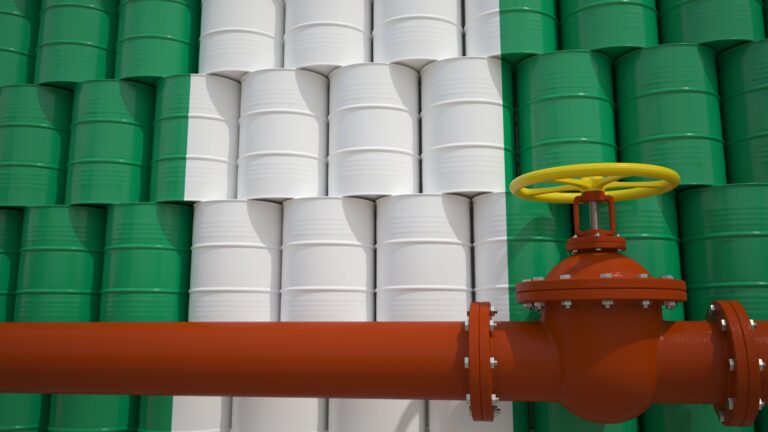
This is understandable, on the basis that Nigeria is not only the largest oil producer in Africa (15th in the world), but it also has the 10th largest oil reserves on the planet.
At the same time however, those same casual observers would be surprised – if not staggered – to know that, until the Spring of 2024, this African mega-economy of 230m people had no properly functioning facilities to convert their oil to usable products. In short, until this year, Nigeria did not have one single fully operating oil refinery!
“Importing 100% of the country’s refined fuel demand has become a ruinously expensive exercise.”
Having no refining capacity puts a country at a significant economic disadvantage. Being able to produce crude oil is meaningless to a consumer, if that crude oil cannot be converted to something useful locally (i.e., petrol, diesel, lubricants, plastics). It also presents an interesting paradox for a country that it has to export its entire crude production (2m barrels per day) only to then receive a quarter of that back (500,000 bpd) as refined products that have been produced elsewhere in the world.
Over the last 20 years, this particular paradox has become increasingly problematic, as Nigerian oil production has fallen by 50% since 2005, reducing $ receipts and eating big holes in the country’s $ reserves. Furthermore, whilst crude oil revenues have largely gone to exploration companies and Nigeria’s obscene army of corrupt middlemen and hangers-on, the state owned Nigerian National Petroleum Corporation has been wholly responsible for importing refined products at a cost of $2.4bn per month.
Add into the mix endless government subsidies for transport fuels (in 2023, the average price of petrol in Nigeria was 18ppl) and it is little wonder that importing 100% of the country’s refined fuel demand has become a ruinously expensive exercise.
Not surprising then that the oil world, and a fixated Nigerian public, are watching the opening of the new Dangote Refinery with enormous interest. This facility has been some time in the making, with plans going back to 2013 for a state-of-the-art refinery to be built on marshland 30km east of Lagos.
Construction began in 2017 but by the time Covid hit, the project was mired in construction disputes, logistical hurdles and financing delays. Nonetheless, 10 years after plans were first put down, Dangote refinery was inaugurated in May 2023 with trial batches of crude going through the different processing units. Diesel and jet fuel production was first off the blocks, in January 2024, and gasoline supply is confidently predicted to begin in May of this year.
It is a source of significant local pride that the owner of the refinery is not the government, nor an international oil company, but a local, Nigerian conglomerate – the eponymous Dangote Group, which is headed up by Africa’s richest man (and avid Arsenal fan) Aliko Dangote. He has given his name to an impressive piece of kit, with production scheduled to come in at 650,000 barrels per day, making it the 7th largest refinery in the world.
It will be bigger than any unit in Europe and approximately 3 times the size of the UK’s largest refinery (Exxon Fawley). Equally important is Dangote’s technical sophistication, with a Nelson (Refinery) complexity classification of 10.5 (out of 14). This puts it above most US and European refineries (US average = 9.5 / EU average = 6.5) and means that process configurations can easily be switched to meet ongoing developments in local (Nigerian) demand.
Finally, because the refinery’s production levels will meet 100% of local demand (with a 150,000 bpd surplus to trade on overseas markets), Nigeria can now look to rebuild its $ reserves, whilst simultaneously reducing foreign exchange costs. The Central Bank of Nigeria estimates foreign exchange savings of between $25bn – $30bn annually, as a result of producing and selling refined products in Nigerian Naira.
“It will be bigger than any unit in Europe.”
All of this should make happy reading for Nigerian consumers of fuel, but it does present a slightly less positive outlook for the European refining industry. Our refineries are basically old-school gasoline machines that reflect the demand economics of the 1960s and 70s, which is when they were built, and when gasoline was the main grade of fuel.
The turn of this century saw the displacement of petrol by diesel in the automotive sector and this meant that European refineries were producing way more petrol than they could feasibly sell into domestic markets. As a result, they became heavily reliant on Nigeria’s 35m litre per day petrol demand, which acted as a “sink” for European exports.
The loss of this sales channel will undoubtedly hit a number of European refineries hard and worse still, with expected gasoline production approximately twice that of daily Nigerian demand, Dangote looks likely to be able to export its products to the rest of the African continent and beyond.
Basically, not only will Nigeria not need European gasoline, the new Nigerian super- refinery may soon be stealing market share within Europe itself.
www.stabilityfromvolatility.co.uk
Image credit: Adobe

